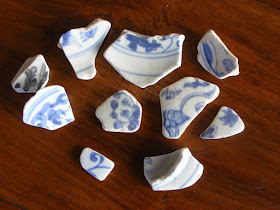On Tuesday,16 May 1865, 28 ships were anchored in Table Bay, Cape Town: of these, seventeen were to be lost in the storm which was about to strike with shattering force. Contemporary news reports bring home to us the dramatic and tragic series of events, as well as the frustration and disbelief of those on shore who watched helplessly as vessels were driven ashore and crews and passengers drowned in the surf.
The Cape Argus reported on Thursday, 18 May:
On Monday ... (15 May) the
wind blew strongly from the westward, and in the evening heavy rains
fell. Tuesday was showery, with the wind still blowing from the
same direction as on the previous day, but in the course of the night a change
took place, and a gale commenced from the north-west. By daylight
yesterday a tremendously heavy sea was setting in, while the wind came down in
terrific gusts, and the vessels anchored in the bay rolled and pitched with
great violence. As soon as there were sufficient light for the
purpose, a signal was made from the Port Office, directing the vessels in
harbour to strike top-gallant masts, and to point yards to the
wind. As daylight increased several cargo-boats put off with
anchors, and two or three vessels, which had parted, were supplied with extra
holding gear. At half-past eight an anchor was run to the Esther. The sea,
however, continued to rise, and many larger boats which were at their moorings
parted, and were driven ashore. Between nine and ten o’clock one of
these was observed to be adrift when one of the Water Police, a young man named
Charles Bryce, who had gone on board the police boat near the North Wharf, for
the purpose of throwing out the ballast, conceived the idea of going to her
assistance. With this in view he got into the dingy, and pushed
off, but before reaching the cargo-boat, the dingy capsized, and the
unfortunate fellow was thrown out. The accident was witnessed by
some hundreds of people, and an attempt was at once made to render him
assistance; it was seen that he had struck out manfully and was making for the
Central Causeway, but owing to his being burdened with his oilskin his progress
was slow. Efforts were made to launch a fishing boat from the front
of the Sailors Home, but it was discovered that no oars were to be obtained.
In the mean time a couple of life-buoys were procured from the Port Office, and
were conveyed to the end of the Causeway, and a gallant fellow named Maderasse,
stripped himself and plunged himself into the waves from the beach. Most gallantly did he breast the waves, dipping his head on the approach the
breakers, and when he had accomplished about one fourth of the distance from
the beach to the point at which the drowning man was struggling, the people on
shore saw the latter go down. He had battled hard for life, but was
at length overcome and perished within sight of hundreds anxious to render him
assistance. Shortly after this, the
cargo-boat Stag ... was capsized while in the act of going about, and it is
feared that out of a crew of nine men two only were saved.
At 11h00 the
Galatea brig parted her anchor but was safely beached on the sands beyond the Castle.
The Galatea was shortly joined by the brig Jane,
and the cutter Gem, and
before two o’clock five other vessels were on shore; they were the bark Star of the West, the schooner Fernaude, the schooner Clipper, (the latter having
dragged her anchors), and the bark Frederick
Bassil. About two o’clock, the barks Alacrity and Deane also parted and drifted down upon the
steamer Dane.
The former carried away the steamer’s boat, and the latter her jib boom, losing
her own top-mast, and sustaining other injuries. Both vessels then
drifted helplessly down upon the beach. Later still they were
followed by the bark Royal
Arthur, which took the ground near the south wharf, and she again was
followed by the brig Kehrweider,
the schooner Isabel, the
Dutch brig Maria Johanna,
and the brig Figilante.
During this time the bay was one
sheet of foam, the seas breaking at least two miles from the shore. The wind blew with almost unprecedented violence, and the men in charge of the
few anchor-boats which remained fit for use hesitated in risking their lives by
going off. One fine boat, the Providence, was
dismasted about the middle of the bay, but having an anchor on board, pitched
it out and hung on by the warp. There are said to be seven men on
board of her, who are almost utterly without provisions, but hitherto no
attempt ... has been made to rescue them from what appears
a hopeless position. No ordinary boat could live in the tremendous
seas which are coming in, while one life-boat is high and dry on the beach, and
the others are said to be unfit for use. It appears that the Providence had gone off with an anchor to the Figilante, and while in the act
of putting the warp on board, the brig parted her anchors and came into contact
with the boat, carrying away her mast. One of the men succeeded in
reaching the brig, and came on shore when the vessel grounded, but the
remaining seven are believed still to be in the boat. The mail steamers Dane,
Athens, and Briton keep their engines going, but the
former labours a good deal, and is apparently in distress. On the
beach the scene is a very painful one; the seventeen vessels, together with the
cutters and a large number of cargo-boats, form a dismal picture. Unless the wind changes there will hardly be a vessel left in the bay tomorrow
morning.
This was no exaggeration.
The
wind has freshened somewhat, and the swell is tremendous. Another
vessel, supposedly the brig Esther,
has parted. The night is intensely dark, and huge bonfires have
been lit upon the beach, as some guide to vessels which may still
part. It is rumoured that the mail steamer Athens is on the rocks at Sea
Point. The rain is falling in torrents. The City of Peterborough is said to be breaking up.
The
following is a list of the vessels now on the beach.
Alacrity, bark, 817 tons, Captain
Goouch.
Clipper, schooner, 75 tons, Captain Carsens
City
of Peterborough, bark, 300 tons, Captain Wright.
Deans, bark, 91 tons, Captain Brabour
Esther, Hamburg brig, 341 tons, Captain
Bottschen
Frederick
Bassil, bark, 341 tons, Captain
N. Glendising.
Figilante, Danish schooner, 74 tons, Captain N. Claster
Fenande, schooner, 86 tons, Captain Giles.
Gem, cutter, 42 tons, Captain Parew
Galatea, brig, 155 tons, Captain Kingston.
Isabel, schooner, 97 tons, Captain Nelson.
Jane, brig, 215 tons, Captain Picot.
Kehrweider, brig, 150 tons, Captain Havenberg.
Maria
Johanna, bgtne, 204 tons, Captain
Driest.
Royal
Arthur, bark, 301 tons, Captain
McDougal.
Star
of the West, bark, 386 tons, Captain
Edlery.
Benjamin
Miller,
schooner, 25 tons.
Worse was to come. The mail steamer
Athens was rumoured to be on the rocks. The night was intensely dark and there was torrential rain. Huge bonfires had been lit on shore as a guide to any vessels that might still come to grief. The fate of the
Athens was soon discovered:
... the wreck was lying
between the two light houses ... a crowd of Green Point residents
assembled, with lights, ropes, and life-buoys for the purpose, if possible, of
rendering assistance, but quite unable to do so. The ship was lying
sixty or eighty yards from the shore, grinding heavily on the rocks with every
sea, and evidently fast breaking up, for pillow cases and cabin doors were
washing ashore, so as to leave no doubt that the wreck was
complete. No dead bodies could, however, be found on the beach, but
in the face of the tremendous seas and the boiling surf, it appeared impossible
that any single one of the unfortunate people on board could reach the shore
alive. It was supposed that the hands had taken to the shrouds, but
the darkness was too intense to allow them to be seen. Occasionally, however, as the heavy sea struck the ill-fated vessel, loud wails
of anguish were heard proceeding from it, and the effect upon the crowds of
spectators was terrible. The Athens ... carried about thirty hands, including
Captain David Smith and officers. She was to have sailed for Mauritius
yesterday, and some fear is entertained that part of her passengers embarked on
Tuesday. This, however, is hardly likely to have been the case, and
embarkation yesterday was impossible.The
storm still rages with unabated violence; and the probability is that at
daylight not a vestige of the Athens will be left above water.
We
have since learned that the steamer has entirely broken up, and not one of her
crew has come ashore either alive or dead. The wind continues to
blow fiercely.
The remains of the
Athens - a portion of her boiler and cylinder - can today be seen between rocks not far from shore, a mute reminder of the disaster of 147 years ago.
 |
| Athens |
Photos at
http://www.flickr.com/photos/hilton-t/4929341806/














